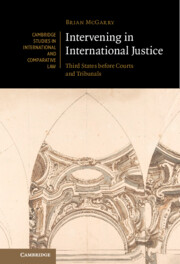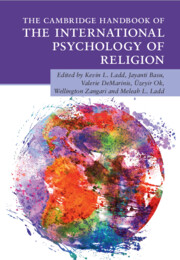Refine search
Actions for selected content:
3410435 results

Celestial Mechanics
- Classical and Modern Methods
- Coming soon
-
- Expected online publication date:
- May 2026
- Print publication:
- 31 May 2026
-
- Book
- Export citation

Fatigue Design of Marine Structures
- Coming soon
-
- Expected online publication date:
- May 2026
- Print publication:
- 31 May 2026
-
- Book
- Export citation
The Cambridge Companion to Pindar
- Coming soon
-
- Expected online publication date:
- May 2026
- Print publication:
- 31 May 2026
-
- Book
- Export citation
Spirituality in Mind
- Psychiatry in a Post-Secular Age
- Coming soon
-
- Expected online publication date:
- May 2026
- Print publication:
- 31 May 2026
-
- Book
- Export citation

Intervening in International Justice
- Third States before Courts and Tribunals
- Coming soon
-
- Expected online publication date:
- May 2026
- Print publication:
- 31 May 2026
-
- Book
- Export citation

Settlement and Risk Assessment in International Commercial Arbitration
- Coming soon
-
- Expected online publication date:
- May 2026
- Print publication:
- 31 May 2026
-
- Book
- Export citation

The Cambridge Handbook of the International Psychology of Religion
- Coming soon
-
- Expected online publication date:
- May 2026
- Print publication:
- 31 May 2026
-
- Book
- Export citation

The Shrikhande Graph
- A Window on Discrete Mathematics
- Coming soon
-
- Expected online publication date:
- May 2026
- Print publication:
- 31 May 2026
-
- Book
- Export citation
Essential Evidence-Based Medicine
- Coming soon
-
- Expected online publication date:
- May 2026
- Print publication:
- 31 May 2026
-
- Book
- Export citation
Inference in Statistical Modelling and Machine Learning
- A Concise Introduction
- Coming soon
-
- Expected online publication date:
- May 2026
- Print publication:
- 31 May 2026
-
- Book
- Export citation
Financial Enterprise Risk Management
- Coming soon
-
- Expected online publication date:
- May 2026
- Print publication:
- 31 May 2026
-
- Book
- Export citation
Half a Century of Supergravity
- Bridging between Einstein and the Quantum
- Coming soon
-
- Expected online publication date:
- May 2026
- Print publication:
- 31 May 2026
-
- Book
- Export citation

The Making of the Dominican Liturgy and Its Chant
- Coming soon
-
- Expected online publication date:
- May 2026
- Print publication:
- 31 May 2026
-
- Book
- Export citation

Gangster of New York
- A Violent Life in Nineteenth Century America
- Coming soon
-
- Expected online publication date:
- May 2026
- Print publication:
- 31 May 2026
-
- Book
- Export citation

The Political Economy of Rwanda's Rise
- Coming soon
-
- Expected online publication date:
- May 2026
- Print publication:
- 31 May 2026
-
- Book
- Export citation
The Mysteries of Modern Life
- Mystery Fiction, Popular Narrative, and the Politics of Vision
- Coming soon
-
- Expected online publication date:
- May 2026
- Print publication:
- 31 May 2026
-
- Book
- Export citation
The Constitution of 1789
- A New Introduction
- Coming soon
-
- Expected online publication date:
- May 2026
- Print publication:
- 31 May 2026
-
- Book
- Export citation
A Global History of Modern Japan
- Coming soon
-
- Expected online publication date:
- May 2026
- Print publication:
- 31 May 2026
-
- Book
- Export citation

Aboriginal and Torres Strait Islander Education
- An Introduction for the Teaching Profession
- Coming soon
-
- Expected online publication date:
- May 2026
- Print publication:
- 31 May 2027
-
- Textbook
- Export citation
Between Ethics and Economics
- A Moral Leeway Approach to Business Ethics
- Coming soon
-
- Expected online publication date:
- May 2026
- Print publication:
- 31 May 2026
-
- Book
- Export citation
